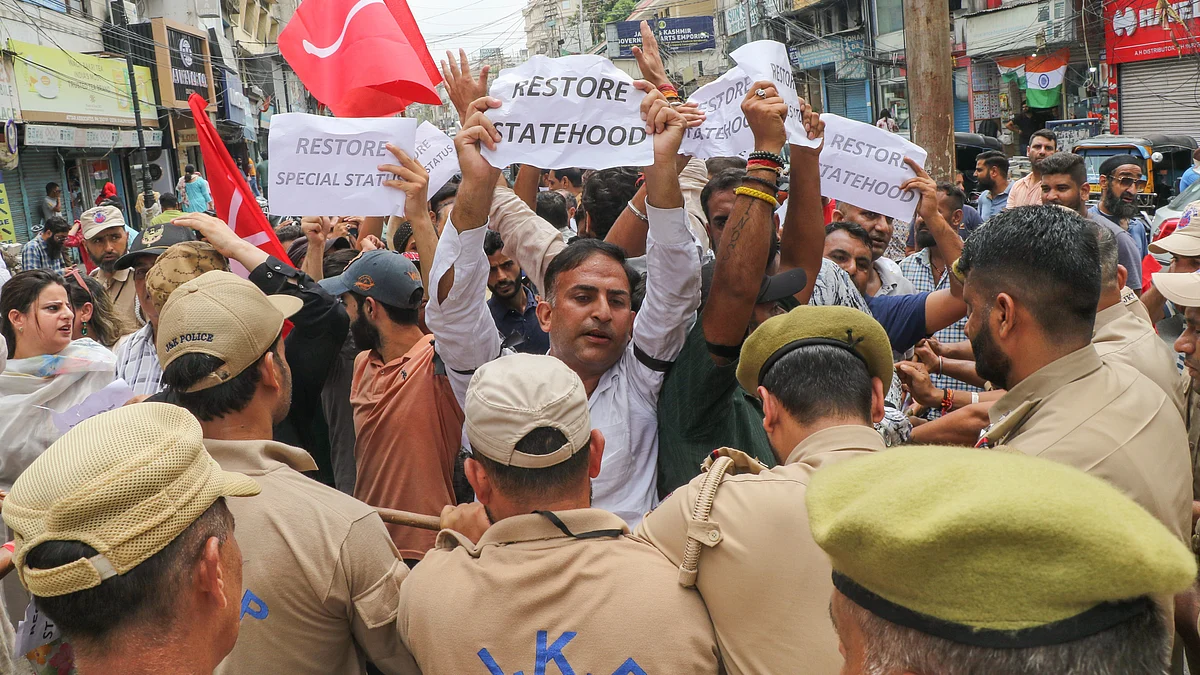Statehood of Jammu and Kashmir: Supreme Court calls for Centre’s response
The apex court also noted the ‘ground realities’ of the Pahalgam terror attack, at the same time

The Supreme Court on 14 August, Thursday, asked the Centre to respond to a plea demanding the reinstatement of full statehood for Jammu and Kashmir, while also emphasising that the current ground realities, including the recent terror attacks in Pahalgam and the aftermath of Operation Sindoor, cannot be overlooked.
“You also have to take into consideration the ground realities… You cannot ignore what has happened in Pahalgam,” chief justice of India B.R. Gavai stated when senior advocate Gopal Sankaranarayanan and others sought an expedited hearing.
The bench also included Justice K. Vinod Chandran.
Solicitor general Tushar Mehta, representing the Centre, requested the court to dismiss the plea, noting that in the past, the court had levied costs on similar petitions.
“Elections are conducted, and my lords are aware of the unique circumstances in this region. Several considerations influence decision-making,” Mehta explained.
The court scheduled the case for the next hearing after eight weeks. The plea was filed by academician Zahoor Ahmad Bhat and socio-political activist Ahmad Malik.
Sankaranarayanan, appearing on behalf of Bhat, pointed out that it has been 21 months since the judgement of the Constitution bench on various issues including the abrogation of Article 370.
Referring to the judgement, he observed that the court did not address the issue of restoring statehood because of the solicitor general’s assurance that it would happen.
“There has been little progress partly because the Union had assured the court that statehood would be restored,” Sankaranarayanan said.
Sankaranarayanan added that the court only directed the earliest possible restoration of statehood, without setting any specific timeline.
His reference was to the judgement of 11 December 2023, when the Supreme Court unanimously upheld the revocation of Article 370, which granted a special status to the former state of Jammu and Kashmir. The court had at the time also ordered that elections be held in the union territory by September 2024 and that its statehood be restored “at the earliest”.
Last year, meanwhile, a plea was filed seeking a directive to the Centre to restore Jammu and Kashmir’s full statehood within two months.
“The delay in restoring statehood would seriously undermine the democratically elected government in Jammu and Kashmir, violating the fundamental idea of federalism enshrined in the basic structure of the Constitution,” the plea stated.
It noted that the assembly and Lok Sabha elections were conducted peacefully in Jammu and Kashmir without any reports of violence, disturbances or security issues.
“The plea asserts that there is no security-related obstacle preventing or hindering the restoration of statehood, contrary to delays claimed by the government,” it added.
According to the plea, failure to restore the status of statehood would result in a lesser form of elected government, especially since legislative assembly results were announced on 8 October 2024.
Despite the court’s direction for early restoration of statehood, however, the Centre has not provided any timeline for its implementation, the plea alleged.
“Jammu and Kashmir has been functioning as a union territory for nearly five years, leading to significant setbacks in its development and impacting the democratic rights of its residents,” it said.
The Supreme Court’s December 2023 verdict opined that Article 370, introduced in 1949 to give Jammu and Kashmir special status amongst the other Indian states, was meant to be a temporary measure.
The court further stated that the President of India had the authority to revoke this provision because the erstwhile state's constituent assembly had already been dissolved in 1957.
With PTI inputs
Follow us on: Facebook, Twitter, Google News, Instagram
Join our official telegram channel (@nationalherald) and stay updated with the latest headlines
